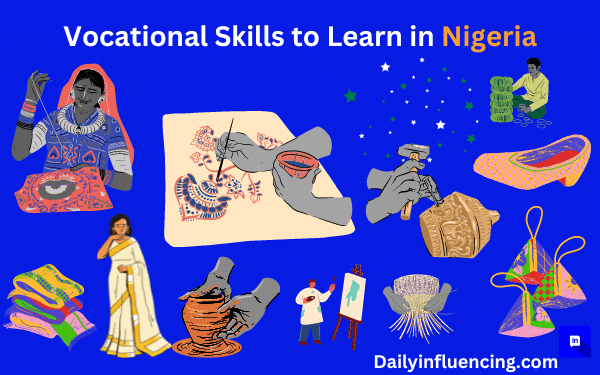
This article will walk you through on setting you up for the best vocational skills to learn in Nigeria.
“Learn a trade!’ That has been the mantra of virtually every educated person in Nigeria. The need for practicality and a real show of one’s skills and actual work other than a degree became widespread in Nigeria around 2020. The world practically opened up to newer perspectives.
The acquisition of vocational skills holds the key to unlocking vast opportunities in various sectors and is crucial for sustainable economic growth. We will explore vocational skills to learn in Nigeria, the high-paying ones.
It doesn’t matter if you are looking to start a new career or boost your chances of getting hired in a competitive market, having vocational skills at a mastery level can be greatly instrumental in determining your job status. Walk with me.
“Learn a trade!’ That has been the mantra of virtually every educated person in Nigeria. The need for practicality and a real show of one’s skills and actual work other than a degree became widespread in Nigeria around 2020.
The world practically opened up to newer perspectives. The acquisition of vocational skills holds the key to unlocking vast opportunities in various sectors and is crucial for sustainable economic growth. We will explore vocational skills to learn in Nigeria, the high-paying ones.
It doesn’t matter if you are looking to start a new career or boost your chances of getting hired in a competitive market, having vocational skills at a mastery level can be greatly instrumental in determining your job status. Walk with me.
What Are Vocational Skills?
Vocational skills, also known as technical or trade skills, are practical abilities that prepare individuals for specific jobs or professions. Unlike academic education, which focuses on theoretical knowledge, vocational skills emphasize hands-on training and practical experience.
Vocational skills are practical abilities that enable individuals to perform specific tasks and jobs proficiently within various trades or professions. They can help you get jobs and are usually in high demand as it doesn’t cost too much to acquire a vocation.
These skills technically work by blending technical know-how with hands-on training. That is, you get to practice whatever is being taught on the spot.
For instance, an engineering student in the university who is studying electrical engineering will not get as much experience as one who is learning the trade hands-on. They often involve direct experience from their tutors.
Going forward, if you’re looking to secure employment or venture into entrepreneurship, truthfully, you can only do so much with your certificate now, the real OGs are those who have a skill.
You have your shot to explore top vocational skills to learn in Nigeria to achieve economic stability and personal growth.
Insights into Vocational Skills
Here are some key insights you shouldn’t miss while going through this blog. As much as learning a vocation is unprofessional, it still has processes you should consider before you decide to just hop on anyone. Let’s delve into some take on for vocational skills to learn in Nigeria.
Specific and Practical
Vocational skills are directly applicable to a particular occupation or industry. They enable individuals to perform tasks related to their chosen field. If you are already in a line of work, there is a vocation out there for you, don’t just hop on anything.
It would be better if you mixed your degree with what you want as a vocation, and let them correlate one way or another. Your chances of succeeding as an entrepreneur or a workforce in an organization would be higher.
Job-Ready Skills
Vocational training equips learners with the competencies needed to enter the workforce immediately after completion. These skills are often in demand by employers. Everyone loves a worker with experience and no better way to get that than learning hands-on.
Diverse Fields
Vocational skills cover a wide range of areas, including automotive repair, construction, healthcare, culinary arts, fashion design, welding, and more. There is just a vocation for almost everything.
Certification and Licensing
Many vocational programs offer certifications or licenses upon successful completion. These credentials validate a person’s skills and enhance employability.
Then, some might not need to go through the university to be recognized. It is imperative to note this and go for the ones with certification to boost your chances of getting picked in the real world.
Hands-On Learning
Vocational education involves practical exercises, workshops, and real-world scenarios. Learners gain experience through internships, apprenticeships, or on-the-job training.
Flexibility
Vocational skills can lead to various career paths. For example, a certified welder might work in construction, shipbuilding, or manufacturing. A certified photographer can work in a media house or as a photojournalist or even in wildlife.
Entrepreneurship
Vocational skills empower individuals to start their businesses. A skilled tailor, for instance, can open a boutique or offer custom clothing services. It can be easy to start a business.
Adaptability
As industries evolve, vocational professionals can update their skills to stay relevant. Continuous learning is essential.
In summary, vocational skills bridge the gap between education and employment, providing practical know-how for a successful career. Whether you’re interested in fixing cars, designing clothes, or working in healthcare, vocational training offers valuable opportunities.
Are Vocational Skills Worth Learning in 2024?
Of course! Vocational skills remain highly valuable in 2024, let us explore the reasons why this is so:
1. Job Market Demand
Many industries still rely on skilled workers. There’s a consistent demand for professionals with practical expertise in construction, healthcare, or technology.
We don’t want to place emphasis on one and discredit the other. But you know those industries that rely majorly on ability and not degrees. Let us take the Ben Carson story, he wasn’t a bright kid at school, but he was a very good surgeon.
2. Entrepreneurship
Vocational skills are still worth learning because they empower entrepreneurs. From starting a bakery to offering digital marketing services, these skills allow you to create your own business.
You could do different things and then have an inkling to create a new idea. Having these skills enables entrepreneurship and gives room for exploration and growth.
3. Adaptability
Vocational skills adapt to times and periods, they’d only ever have a little tweak to suit the age. So, even as technology evolves, foundational skills like carpentry, plumbing, and welding remain relevant. They have adapted to their needs. So learn that skill, no matter what it is, you can tweak it to be as big as you want.
4. Global Economy
Vocational skills contribute to economic growth. You need to learn that skill to better the economy that is already deteriorating.
Even the federal government in Nigeria has urged youths to acquire a skill to drive significant advancements in Nigeria’s skills development sector and position the country to better meet the demands of the modern workforce and contribute to its economic growth. They drive productivity and innovation, benefiting both individuals and societies.
For a plus, the federal government in Nigeria promised to establish 24 hubs for innovation across the nation, Nigeria.
That is to tell you that acquiring a skill is necessary and important to help yourself and the economy foster entrepreneurship and reduce strain on the job market.
5. Personal Fulfillment
Above all, learning a skill you’re passionate about brings fulfilment. Whether it’s cooking, photography, or hairstyling, it enhances your quality of life.
You feel a sense of accomplishment once you have conquered this phase of learning something worthwhile to support your degree or to feed yourself in the future.
Vocational skills are not only worth learning, they are also essential for personal growth, employability, and economic stability. So, yes, it is still worth it to learn a vocational skill.
Top 10 High-Paying Vocational Skills to Learn in Nigeria
Let us get to the bane of this blog post. If you want Top High-Paying Vocational Skills to learn in Nigeria, then walk with me as we explore the best skills to learn in 2024.
1. Tech
It is 2024, you must have heard this word before. I am sure even the deaf have heard it. It has gone mainstream, thanks to the covid-break that made people search far and wide. Now, the tech world is a whole different topic on its own.
Tech is digital technology and all its activities. So just go online and look for tech jobs or visit my page. You can explore coding, web development, full-stack development, Product design, and so on.
Also, this is probably one of the best-paying skills you could learn. Once you acquire it and get a job, you are made for life. You would only consider a school for the degree.
2. Fashion Design
The world of fashion relies heavily on skilled designers who can create unique and appealing clothing. Just as digital designers are needed for graphics in the tech space, fashion designers play a crucial role in shaping trends and creating stylish garments in real life.
If you think you can’t earn a living being a fashion designer, think again while you read about Veekee James. She is an award-winning fashion designer and has proven that she is the best at what she does countless times.
She is a celebrity fashion designer. You could be the next Veekee James, so don’t look down on this lucrative vocation.
3. Digital Marketing
I’d categorise this under tech, however, some people who do not know jack about tech skills are successful digital marketers.
This is because a Digital marketer can be an SEO specialist or a marketer in the digital world. So, in today’s digital age, businesses need professionals who understand social media marketing, copywriting, email marketing, search engine optimization (SEO), and paid advertising (such as Facebook and Google Ads).
Digital marketing experts can earn significantly due to their ability to drive online visibility and revenue, so if you know how to get people to patronise a brand or you are a successful online strategist on how to curate words to compel, you could earn millions of naira if you took up the skill seriously.
4. Photography and Cinematography
Skilled photographers and cinematographers are sought after for events, weddings, corporate shoots, and content creation. You could even get a lecturing job as one with profound skill.
However, there is a high demand for them in this age due to the clamour for high-quality content and great shots and angles. High-quality visuals are crucial for marketing and storytelling.
Maybe your friend has been commending you for taking great shots, you should think about acquiring it as a skill. Who knows, you might be the next TG Omori. Depending on how good you are and your portfolio, you could earn millions low-key.
5. Interior Design
Interior designers transform spaces into functional and aesthetically pleasing environments. Their expertise is valued in residential, commercial, and hospitality projects.
Do you think that you do a great job at designing homes or you are a lover of aesthetics in the home? Check out interior designing. In this age, people want to design their homes, so you could make good money doing this.
6. Culinary Arts and Catering
Culinary professionals, including chefs and caterers, can earn well by providing delicious meals and catering services for events, restaurants, and private clients.
You could even get a permanent job in a hotel as a caterer or chef, and they don’t pay little for that service. If you love the kitchen and culinary aesthetics, you should consider Catering, it is another money changer in this age as people cannot do without eating and are always celebrating one occasion or the other.
7. Hair Styling and Beauty
Hairdressers, makeup artists, and beauty professionals are essential for personal grooming and styling. Salons, spas, and beauty clinics rely on their expertise.
You might downplay this as a lucrative skill to learn, but you are wrong. Paying attention to skills like this, you’d note that they adapt and will never run out of demand as long as human beings still live. People go for occasions, they want to look good.
Although it might not pay as much as others per client, this skill gets more clients in a day and could make a monthly income equivalent to or more than the others. Consider this if you love doing makeup or any form of grooming.
8. Automobile Mechanics
Skilled mechanics who can repair and maintain vehicles are always in demand. With the increasing number of cars on the road, this skill remains valuable.
And the more expensive the car, the more it costs to get it fixed. Do you love automobiles? Try acquiring the skills at a mechanic’s shop or automobile industry, you’ll be glad you did.
9. Welding and Fabrication
Welders and fabricators work with metal to create structures, machinery, and artistic pieces. Their craftsmanship is essential in construction and manufacturing. So you probably know how to turn metal to something nice and artistic, depending on how you position yourself, you could earn a lot doing this.
10. Event Planning
Last but not least, event planning. This is one of the most underrated skills to learn. As an event planner, you are technically in charge of an event and make the calls. It is not a small job to do, but the monetary compensation for the stress is worth every stress.
Event planners usually charge from ₦300,000 depending on the number of attendees. To be an event planner in an event, you know the contractor has money to spend and you can charge based on your discretion. If you have an opportunity to acquire this skill, hop on it.
Remember that vocational skills not only provide employment opportunities but also empower individuals to start their businesses and become entrepreneurs. Whether you’re interested in fashion, technology, or craftsmanship, developing these skills can open doors to a rewarding career in Nigeria.
Best Practices for Vocational Skills in Nigeria
When pursuing high-paying vocational skills in Nigeria, consider the following best practices:
- Skill Mastery: Dedicate time to mastering your chosen skill. Whether it’s fashion design, digital marketing, or welding, continuous learning and practice are essential. Don’t slack!
- Industry Trends: Stay updated with industry trends and technological advancements. Attend workshops, conferences, and online courses to remain relevant. The world is changing rapidly, so you need to be abreast with new developments to support your vocation.
- Networking: Build a professional network. Attend industry events, connect with experts, and collaborate with peers. Networking can lead to job opportunities and partnerships. This can never be overemphasized.
- Portfolio Development: Create a strong portfolio showcasing your work. For instance, if you’re a graphic designer, display your best designs. A compelling portfolio attracts clients and employers.
- Certifications: Obtain relevant certifications. Certificates validate your expertise and enhance your credibility. You are not the only one vying for that position, so make it credible.
Conclusion
We have explored high-paying vocational skills to learn in Nigeria. They are pivotal in addressing the economic challenges in the country, focusing on unemployment and skill mismatches.
Vocational training focuses on practical and life-applicable experiences and is less costly to acquire compared to the result in a financial sense.
So, whether you’re looking to launch a new career or enhance your current skill set, investing in vocational skills is a strategic move toward financial independence and national development.
The skills and best practices discussed in this post are vital for anyone aiming to thrive in Nigeria’s dynamic job market in 2024 and beyond. So, take the initiative and embark on your journey toward acquiring valuable vocational skills today!






